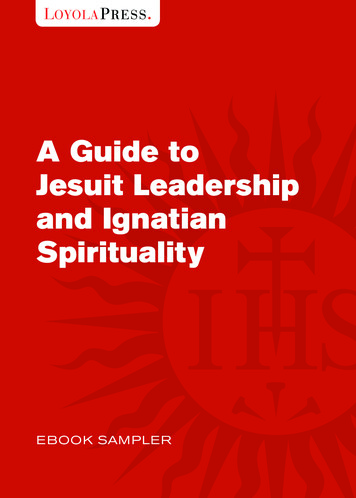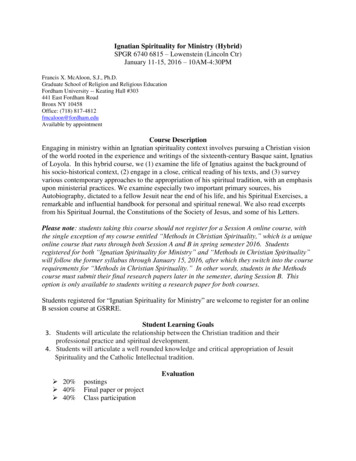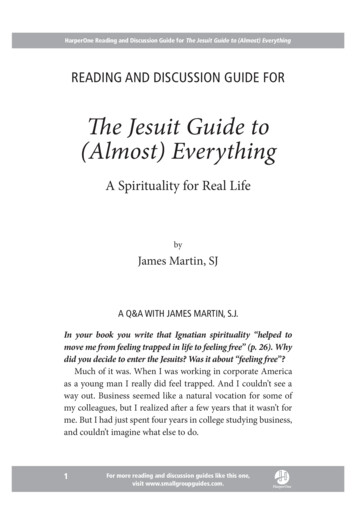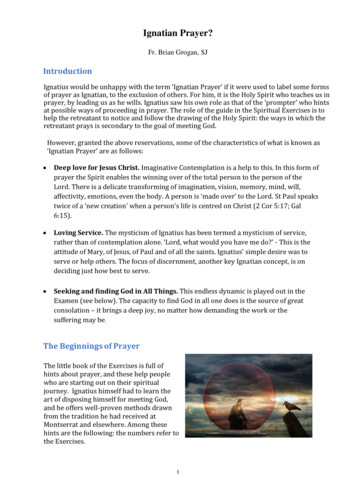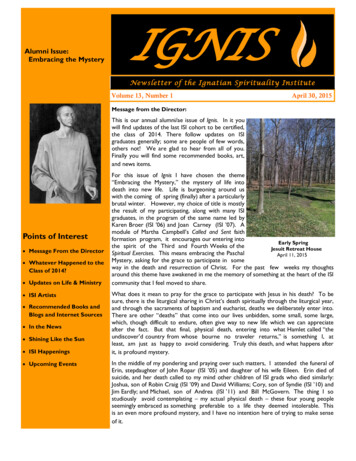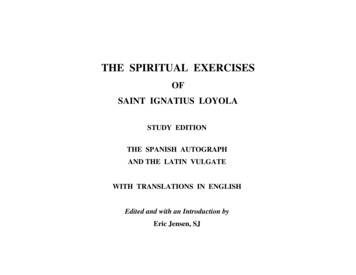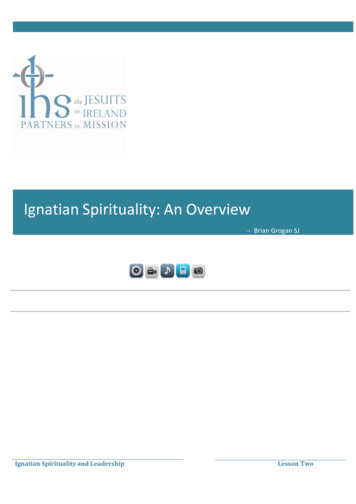
Transcription
Ignatian Spirituality: An Overview–Ignatian Spirituality and LeadershipBrian Grogan SJLesson Two
Page 2 of 8LESSON TWOIGNATIAN SPIRITUALITY: AN OVERVIEWA.INTRODUCTIONWelcome to Lesson Two of the course on Ignatian Spirituality! From Lesson One the intendedlearning outcomes were:A growth in your self-knowledge, through non-judgmental noticingA sense that it is just possible that God is close and very interested in youWe hope that you are coming to a deeper sense of who you are and of what is going on in yourlife right now, and that you enjoy cultivating the skills of reflectiveness. According to Socrates,the unexamined life is not worth living. Ignatius takes this idea to a higher level: the examinedlife, he would assert, brings you an ongoing experience of God as actively present in your life.Hence the value of the Review of Consciousness.As you start Lesson Two, do you notice any differences in yourself between now and when you beganLesson One? Some growth in clarity, energy, joy, hope.?The present Lesson outlines the central features of Ignatian Spirituality. It offers a map so youcan see where you’re at and where you’re going.Lessons Three to Six will deal with Ignatius’ own life and show how his spirituality grew over alifetime.In Lesson Seven we will deal with the broad notion and history of “Spirituality” but for thepresent our working definition will be: “A way of living out your relationship with God.”Thus, monastic spirituality indicates how monks live out their relationship with God. Marriedspirituality indicates how married persons live out their lives together with God, and so on. Asyou can guess, there is a vast range of spiritualities. Ignatian spirituality is the way in whichIgnatius lived in relation to God.There are innumerable ways to present Ignatian spirituality. What follows is a presentation of itin terms of the dynamics operating between God, God’s World, and Yourself.Read contemplatively, and move on only when you have considered each statement. There’sno hurry!Ignatian Spirituality and LeadershipLesson Two
Page 3 of 8The references indicate where you will find the sources in Ignatius’ writings. [Exx SpiritualExercises; Ab Autobiography; Const Jesuit Constitutions ].B.LESSON CONTENTGOD, GOD’S WORLD, MYSELF1. GODGod is still making me: I’m not just another instance of the human race but uniquely importantto God, an original, a masterpiece, yet to be completed (Exx 237). God does so much for mepersonally (he became man for me: Exx 104)I am the beloved of God (The lover gives all to the beloved: Exx 231)God always takes me where I’m at, and works from there. God is not fazed by my dimness ormy backsliding (Ignatius was vain, a brawler, gambler, and womaniser. God dealt with him as ateacher with a dull pupil: Ab 27)God sees what I am and can be: as a lover God sees more in me than others can, and more alsothan see in myself (I ponder how God looks at me: Exx 75, 231)Through the gift of creation, with all its beauty and marvels, and through the life, death andresurrection of Jesus (all for me!), and through God’s particular and unique gifts to me, Godemerges as lovable, as limitlessly concerned for my happiness (Exx 230). God wants to give meHimself (Exx 234). Gifts are the language of personal loveFrom God comes “all that is good” – this invites my gratitude and my response. God is good! (Exx235). Ingratitude shows serious blindness (Exx 60-61)I am gifted with imagination to catch on to what God is doing and to respond creatively(“Imagine!” Exx 53)God is always drawing me into active participation in God’s own life and plans. Life is not aspectator event but an engagement. Choices must be made! (Exx 169-189)God gives me unique gifts, talents and tasks, and a unique placement in the world. No one elsehas my situation, or my set of relationships to work with (Exx 231, 234, 235, 237)Ignatian Spirituality and LeadershipLesson Two
Page 4 of 8God guides me through general influences - Scripture, Church, the wisdom of parents, writers,teachers, books - I learn how to live according to the gospel and as a member of the Christiancommunity (Thinking with the Church: Exx 352-370)But God also deals directly and uniquely with me (Exx 15, 234). God puts good desires into myheart (Exx 5, 234). Grace comes tailor-made to suit me! God sets up situations for me: if I respondrightly to these, joy follows (Consolation: Exx 316)God works on my heart and mind to bring me into tune with his projects: while respecting myfreedom, God gives me good desires, and invites me to attend to my inner drawings (Exx 15,169ff). Love is shown in deeds (Exx 230)God is active, busy, labouring, hard at work in everything (Exx 236) to bring about the FinalCommunity of Love, to which everyone is invited (Exx 102, 107)God provides for me: God gives me the means to do as he wishes. The all-powerful hand ofGod supports me (Const 812). God labours out of love to set things up well for me (Exx 236)2. GOD’S WORLDOur world is loved passionately by God. ‘World’ includes all people and creation itself. God is insolidarity with us, and I am likewise called to be in solidarity with all others, and to love the worldpassionately (Exx 104, 107)The world is very needy: there is a huge gap between God’s project and human projects (Exx102, 106, 107, 108). This is the arena for the drama in which I am already onstage (Exx 95-96).The world needs people of imagination, vision and commitment to undo the damage causedby greed and hatred: people who will ‘carry the fire’ to set the world ablaze (Ab 9, Exx 98)God speaks to me through this messy world. The voice of victims is the voice of God –‘I am Jesus,and you are persecuting me!’ (Exx 95, 106). God communicates with me through ALL persons,events, situations, but I come only slowly to see this (Ab 99). I ask not to be deaf to God’s call(Exx 91)God calls me to service. The needs of the world are unlimited, so my service may take manyforms. But God may want me to focus on one person, one situation, just now. This is what Jesusdid, and I am called to be his close follower (Exx 22, 23, 97, 114, 189; Ab 88). ‘What ought I dofor Christ?’ (Exx 53)Ignatian Spirituality and LeadershipLesson Two
Page 5 of 8MYSELFQuestions of meaning keep arising for me. Reality challenges me on every front, but I can oftenignore it, because it is uncomfortable. But God steps in, and sooner or later I begin to attend(Ab 1)I feel the urge (from where?) to slow down, to stop and reflect: “What’s going on?” “Is this allthere is?” “What’s happening to me?” I STOP TO THINK (Ab 8, 9)My “wake up call” may be something that brings me up short: an accident, falling in love, areligious experience, failure, the experience of parenting etc. (Ab 1)When I attend to my inner moods and desires, I find myself attracted to some things andaverse to others. I experience inner joy and energy when I am open and helpful to others andto God, while I experience disquiet and fragmentation of energy in being negative and unhelpful.Reflection helps me to notice the images and thoughts which lie behind my swings of moods(Ab 7,8; Exx 313-336)If I am open, I develop an active attentiveness to God and try to respond graciously: this is tobe a contemplative in action (J Nadal)My generosity will be tested because my new responses will often go against my impulses andthe prevailing culture (Exx 5, 97). My choices should emerge from a love that comes ‘fromabove’ rather than from selfish concerns (Exx 184)I recognise, perhaps, that God is uniquely encountering ME! (Exx 15). I may experience gladsurprise that God is interested in me and needs me, but this may frighten me too. Adam hid inthe garden on hearing God’s voice (Gn 3: 10)I decide to “give God some of my time” but if I allow it, God will occupy more and more of mytime (Exx 233 – in ALL things to love and serve)I gradually sense that God’s plans are better than mine (Exx 16). Intimacy with God grows –God and I talk everything over where before I acted as if I were alone (Exx 54, 109, 169-189)Prayer shifts! From saying to God: “Help me do what I want to do” I now say: “Help me dowhat you want me to do.” When faced with new situations, I ask: “What should I do?” (Exx53). This opens up the world of service (Exx 54, 94, 98). I ask that I may not spoil what Godwants done (Exx 63)Ignatian Spirituality and LeadershipLesson Two
Page 6 of 8I ask God to show me: God becomes my point of reference, rather than myself or anyone else.More and more I want to do what pleases God (Jn 8:29; Exx 169)I try to do what seems wisest and most loving in any situation. I want in all things to love andserve (Exx 16, 233). I become ‘an instrument’ at God’sdisposal (Const 813)I become one who is led by Another – this ‘leading’ occurs by my attending to the innerpromptings of consolation and desolation (Exx 313-336)I find that I have fallen in love with God! Ignatius fell in love with Christ and with the Saints,and his life’s focus changed. He became God’s person (Ab 99)SummaryThis reflection of Pedro Arrupe, former General of the Society of Jesus, encapsulatesIgnatian spirituality:What you are in love with,what seizes your imagination,will affect everything.Nothing is more practicalThan finding God,That is, falling in loveIn a quite absolute, final way.It will decideWhat will get you out of bed in the morning,What you will do with your eveningsHow you will spend your weekends,What you will read,Who you know,What breaks your heart,What amazes you with love and gratitude.Fall in love,stay in love,and it will decide everything!- Pedro Arrupe SJ, 1907-1991Ignatian Spirituality and LeadershipLesson Two
Page 7 of 8C.REFLECTIONIdentify for yourself one statement in each of the three sections of the above sketch which hasstruck you. Ask yourself “What might this mean for me?”If you have time, continue with other statements.Continue the Review of Consciousness as a regular practice. Ask God to show you how he isworking in your life and that of others. Vary the focus over a week, e.g.: ‘How am I getting onwith my partner?’ ‘How do I spend my weekends?’ ‘What does God think of the way I relate toX or Y?’ ‘Where is God in my illness?’ ‘Am I avoiding that challenge?’Using the Outline of Ignatian Spirituality given above, you can begin to develop richer ways ofseeing and interpreting the situations in which you find yourself.D.RECOMMENDED READINGTraub, G W., SJ, ed: An Ignatian Spirituality Reader. Chicago: Loyola Press, 2008. All thearticles are worth reading: of immediate interest to you may be M K Hellwig’s ‘Finding God inAll Things: A Spirituality for Today’ 50-58, and H Gray’s ‘Ignatian Spirituality’ 59-84.Grogan, B., SJ: Finding God in a New Age. Privately printed: available from MessengerPublications, Dublin. 16pp.E.LINKSWeb sites: See Lesson OneF.INTENDED LEARNING OUTCOMESFrom this Lesson, the intended learning outcome is:that you grasp the central features of Ignatian Spirituality, in terms of the dynamicrelationships between God, God’s World and Yourself.G.ASSIGNMENTWrite a page on some ways in which you can make this new way of seeing relevant to your lifesituation.Administrators might reflect on the fact that they are not labouring alone, but that God is busyon their behalf, and is working too in all members of the staff. This gives hope when things aredifficult.Ignatian Spirituality and LeadershipLesson Two
Page 8 of 8Leaders might contemplate Jesus as he wondered what best to do to get people to catch on tothe vision of the kingdom of God.Each of us can rummage through our moods and desires, to distinguish those that lead to lifeand openness from those that lead to a closing off of the heart and of love.END OF LESSON TWOIgnatian Spirituality and LeadershipLesson Two
Page 4 of 8 Ignatian Spirituality and Leadership Lesson Two God guides me through general influences - Scripture, Church, the wisdom of parents, writers, teachers, books - I learn how to live

